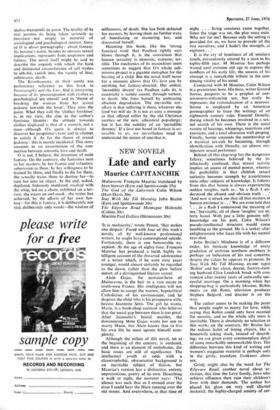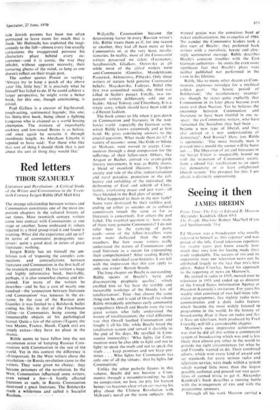NEW NOVELS
Late and early
Maurice CAPITANCHIK
Maltaverne Francois Mauriac translated by Jean Stewart (Eyre and Spottiswoode 35s) The God of the Labyrinth Colin Wilson (Hart-Davis 30s) Slay With Me Till Morning John Braine (Eyre and Spottiswoode 30s) The Edgware Road Montague Haltrecht (Collins 30s) Matilda Paul Gallic° (Heinemann 30s) 'It is mediocrity,' wrote Proust, 'that makes one despair.' Faced with four of this week's novels, all by well-known professional writers, he might have contemplated suicide. Fortunately, there is one honourable ex- ception. At the age of eighty-four, Francois Mauriac has produced a lucid, highly in- telligent account of the thwarted adolescence of a writer which, if he were sixty years younger, would almost certainly be regarded as the dawn, rather than the glow before sunset, of a distinguished literary career.
Alain Gajac, the narrator-hero of Maltaverne, is the heir to a vast estate in south-west France. His intelligence will not allow him to accept the narrow, hypocritical Catholicism of his environment, and he despises the child who is his prospective wife, heiress Jeannette Seris. The girl he wants, Marie, is a book-shop assistant who believes that the social gap between them is too great. After Jeannette's brutal murder, the domineering Mme Gajac wants her son to marry Marie, but Main knows that to live his own life he must uproot himself com- pletely.
Although the milieu of this novel, set at the beginning of the century, is outdated, and there is an element of melodrama, the basic issues are still of significance. The intellectual youth at odds with a claustrophobic, obscurantist background is an inevitable subject of fiction, but Mauriac's version has a distinctive, entirely unpretentious, poetry of its own. Describing a walk at night, the narrator says: 'The silence was such that as I crossed over the river I could hear the Hure running over the old stones. And everywhere, at that time of
night . . . living creatures came together. Since the stage was set, the play must exist. Why not for me? Because only the setting is provided for us, we have to provide all the rest ourselves; and I hadn't the strength, at eighteen ...'
It is the cry of loneliness of all sensitive youth, miraculously uttered by a man in his eighty-fifth year. M Mauriac has perhaps waited until extreme old age to express the conflicts of his early life; the success of his attempt is a remarkable tribute to the con- tinuing vitality of his mind.
Compared with M Mauriac, Colin Wilson is a pretentious bore. His hero, writer Gerard Sorme, purports to be a prophet of con- sciousness-enhancing sex, but really he represents the rationalisation of a neurosis. Sorme is employed by an American pornographer to trace the writings of an eighteenth century rake, Esmond Donelly, during which he becomes involved in a sex- ual search of his own. There is the usual variety of beatings, whippings, insertions and exertions, and a total obsession with peeping. Finally, Sorme astounds the membership of a mystical sex-cult by becoming, through identification with Donelly, an almost om- nipotent sexual performer.
Behind all this clap-trap lies the dangerous fallacy, sometimes believed by the in- tellectually confused, that sexual activity implies an access of mental power, whereas the probability is that childish sexual curiosity becomes strength by transference onto other subjects of knowledge. It follows from this that Sorme is always experiencing sudden insights, such as: 'In a flash I un- derstood the absurd and obvious truth . . 'And now it struck me that all that matters in human existence is ...' We are even told that . . in a flash I understood the meaning of sex.' Inevitably, all of these 'insights' are ut- terly banal. With just a little genuine self- knowledge on his part, Colin Wilson's pseudo-intellectual structure would come tumbling to the ground. He is a seeker after enlightenment who faces life with his mental eyes shut.
John Braine's blindness is of a different order, his intricate knowledge of every gradation of arriviste northern snobbery is perhaps an indication of his real concerns, despite the values he appears to promote. In Stay With Me Till Morning, ex-asc typist 'Robin' and her clean, decent, factory-own- ing husband Clive Lendrick break with con- vention after twenty years of outwardly suc- cessful marriage. On a morning when her shopping-bag is particularly irksome, Robin meets an old flame, television producer Stephen Belgard, and disaster is on the way.
The author seems to be making the point that people ought to marry for love, while saying that Robin could only have married for security, and so the whole silly mess is inevitable. There is absolutely no selection in this work; on the contrary, Mr Braine has the tedious habit of listing objects, like a housewife taking stock, instead of describ- ing: we are given every commonplace detail of some remarkably unremarkable lives. The difference between this kind of writing and women's magazine material is perhaps only in the grisly, mundane frankness about sex.
Grisly might also be the word for The Edgware Road, another novel about ar- rivistes, this time the Levy family, Jews who achieve affluence then ruin their children's lives with their demands. The author has placed his gloss on very well charted material; the highly-charged anxiety of cer- thin Jewish parents has been too often portrayed to leave room for much that is fresh. Mr Haltrecht has exploited the tragi- comedy to the full—almost every line exactly caricatures the exaggerated pressure his characters place behind every oc- currence—and it is comic, the way they inhabit, without apparent necessity, their torturing ghetto of the mind, as long as one doesn't reflect on their tragic past.
The author quotes Proust as saying: 'Always try to keep a patch of sky above your life, little boy.' It is precisely what he himself has failed to do. If he could achieve a larger perspective, he might write a better book, for this one, though entertaining, is trivial.
Paul Gallico is a creator of big-hearted, tough-acting, sentimental legends; this one, his thirty-first book. being about a fighting kangaroo who is claimed as a world boxing champion. The mixture of improbable cockney and low-toned Bronx is as before, and once again he sustains it through inordinate length. As Abraham Lincoln is reputed to have said: `For those who like that sort of thing I should think that is just about the sort of thing they would like.'































 Previous page
Previous page